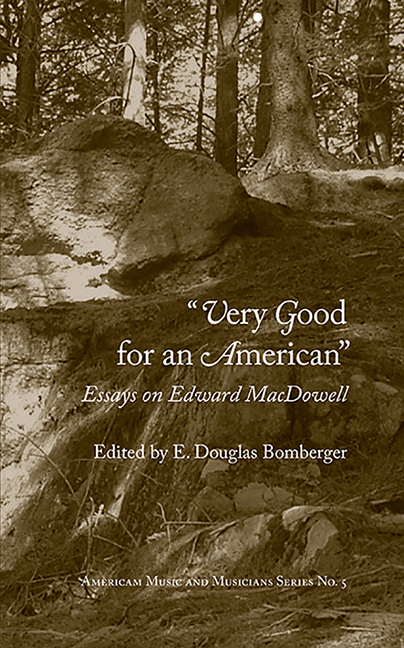Book contents
- Frontmatter
- Table of Contents
- Illustrations
- Contributors
- Acknowledgments
- Introduction: MacDowell at 150
- Edward MacDowell and the Society of Friends
- Historical Concerts in New York City, 1860-1876: An Approximation
- “No MacDowell, No Carreño”: Teresa Carreño's Contributions to the Dissemination of Edward MacDowell's Piano Music
- MacDowell, Liszt, and the Symphonic Tone Poem
- Wagnerian Influence and Motives in the Works of Edward MacDowell
- “On Sundays there was the music …” George Whitefield Chadwick between symphony and organ
- MacDowell vs. Butler: The “Idealist” Professor and the Administrator of “Materialism”
- Parallels in the Careers of Edward A. MacDowell and Chou Wen-chung
- American Bayreuth: The 1910 Peterborough Pageant and the Genesis of the MacDowell Colony
- Selective Bibliography
- Index
“On Sundays there was the music …” George Whitefield Chadwick between symphony and organ
- Frontmatter
- Table of Contents
- Illustrations
- Contributors
- Acknowledgments
- Introduction: MacDowell at 150
- Edward MacDowell and the Society of Friends
- Historical Concerts in New York City, 1860-1876: An Approximation
- “No MacDowell, No Carreño”: Teresa Carreño's Contributions to the Dissemination of Edward MacDowell's Piano Music
- MacDowell, Liszt, and the Symphonic Tone Poem
- Wagnerian Influence and Motives in the Works of Edward MacDowell
- “On Sundays there was the music …” George Whitefield Chadwick between symphony and organ
- MacDowell vs. Butler: The “Idealist” Professor and the Administrator of “Materialism”
- Parallels in the Careers of Edward A. MacDowell and Chou Wen-chung
- American Bayreuth: The 1910 Peterborough Pageant and the Genesis of the MacDowell Colony
- Selective Bibliography
- Index
Summary
On Sundays there was the music in church. And a grander thing than a churchly cadence the boy's imagination could not grasp. Solemn musical debauches were the family reunions at Thanksgiving or Christmas, when uncles, aunts and cousins—some of whom were the possessors of excellent voices—sang praises to the Lord in rich and vibrant harmony. These early experiences left their mark on the boy. His bent for music would not tolerate ignoring.
Carl Engel, chief of the Music Division of the Library of Congress, wrote these words in 1924, in an article on the 70-year-old Boston composer George Whitefield Chadwick (1854–1931). Engel's biographical essay is not only an appraisal of the composer whom the author regarded as mainly a “symphonic composer.” It is simultaneously a reflection of New England's music history when the biographical data of the composer is integrated into its regional context. And even more: it appreciates Chadwick as part of a trio with Edward Mac- Dowell (1860–1908), and Horatio Parker (1853–1919), as he was often seen, usually combined with the question of who was the most American, the most prolific, or the most artistic of the three. It appreciates Chadwick, the least star-like, as the one who probably had the strongest ties to his cultural surrounding—ties which at times bound him down.
Chadwick was born in Lowell, MA, in 1854. His father, who had advanced from a millwright to an insurance agent, was a selfmade man. His youngest son George would start as an assistant organist and assistant music professor and end as a conservatory director and one of the most important symphonic composers of his generation. About his childhood musical experiences Chadwick noted in his “Memoirs” that they consisted of “running after hand organs or funerals with a band,” thus the “Dead March” from Handel's Saul became the first piece of classical music he knew. In 1859 the family moved from Lowell to Lawrence, MA. The elder brother Fitts Henry, who himself played the organ at church, noticed Chadwick's vigorous interest in music and began to give him his first piano lessons.
- Type
- Chapter
- Information
- Very Good for an AmericanEssays on Edward MacDowell, pp. 129 - 142Publisher: Boydell & BrewerPrint publication year: 2017

